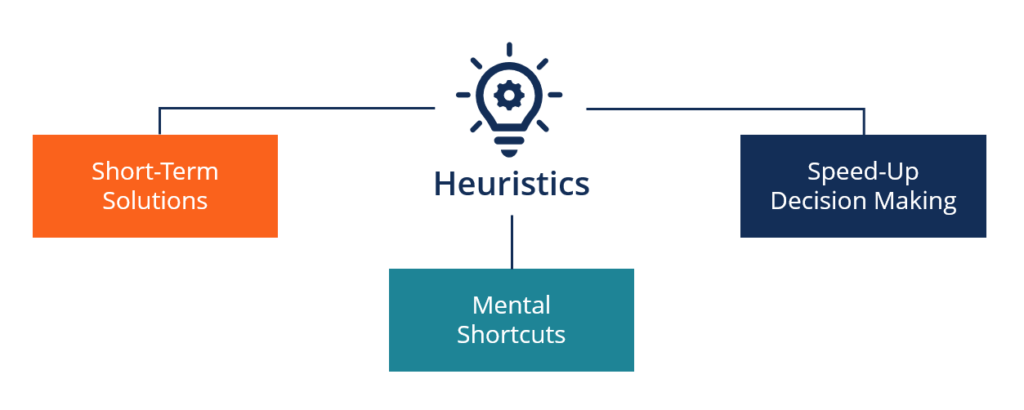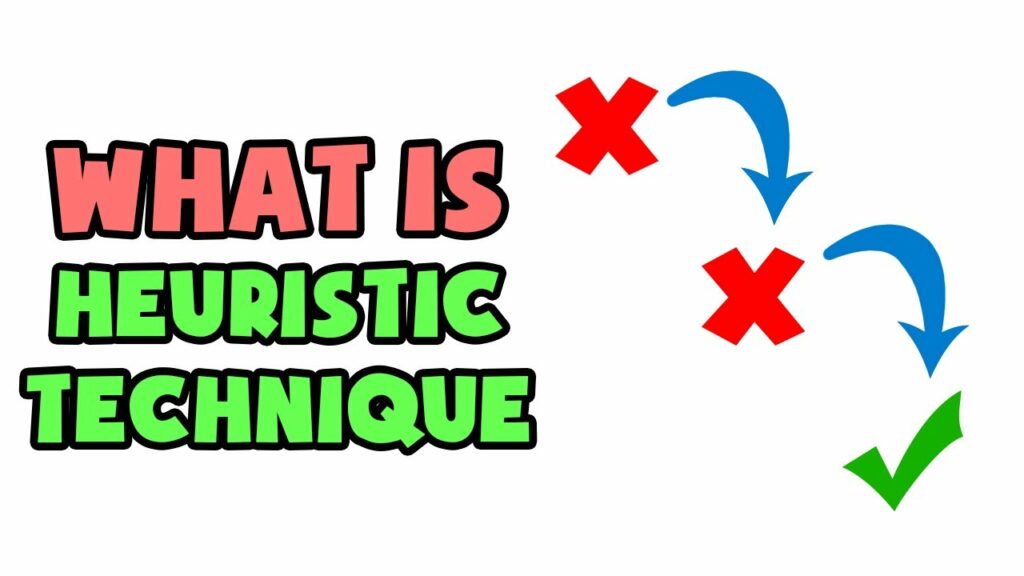We make decisions every day, some big and some small. How do we decide what to do? We use heuristics. Heuristics are mental shortcuts that allow us to make decisions quickly and efficiently. They are often based on our past experiences and allow us to make judgments without having to process all the information. In this blog post, we will discuss the psychology of heuristic and how it affects our everyday lives.
Contents
What Is Heuristic?
 A heuristic is a decision-making process that relies on intuition or experience to simplify complex problems. In other words, it is a mental shortcut that we use to make decisions quickly and efficiently. The heuristic can be helpful in certain situations, but it also has its drawbacks.
A heuristic is a decision-making process that relies on intuition or experience to simplify complex problems. In other words, it is a mental shortcut that we use to make decisions quickly and efficiently. The heuristic can be helpful in certain situations, but it also has its drawbacks.
This feeling of “knowing” something without knowing why is called illusory certainty. It can lead you to make snap judgments that may not be accurate. We use heuristics all the time, often without realizing it. For example, when you are trying to decide if someone is trustworthy, you might use the “halo effect” heuristic. This means that you base your decision on one or two positive traits (such as they are well-dressed or have a friendly face) and ignore any negative information about the person.
The problem with heuristics is that they can sometimes lead you astray. For example, the “anchoring and adjustment” heuristic can cause you to make inaccurate judgments. This heuristic involves starting with a certain estimate (the anchor) and then adjusting it based on new information. However, this adjustment may not be accurate, especially if the new information is partial or ambiguous.
It is important to be aware of the limitations of heuristics so that you can use them wisely. When used correctly, they can help you make quick and efficient decisions. But when they are used incorrectly, they can lead to inaccurate judgments and poor decisions.
Types of Heuristic

There are many types of heuristics, but the three most common are:
Availability Heuristic
Availability is something that we can all relate to. This heuristic is based on the idea that if something is easily recalled, then it must be important.
For example, you might think that because you can remember seeing a lot of car accidents on the news, then car accidents must be more common than they actually are. Or, you might think that because you can’t recall the last time you got sick, getting sick must not be very likely.
The availability heuristic can lead you to overestimate how probable an event is because events that are easily remembered are often given more weight than they deserve.
Representativeness Heuristic
The representativeness heuristic is when we judge something based on how well it represents a group or category.
For example, you might think that because a person is wearing all black and has a lot of piercings, they must be goth. Or, you might think that because a person is wearing a suit and tie, they must be rich.
The representativeness heuristic can lead you to make judgments that are inaccurate because you often judge something based on your own biases and preconceptions.
Anchoring Heuristic
The anchoring heuristic is when we rely too heavily on the first piece of information we receive (the “anchor”) when making decisions.
For example, if you’re asked to guess the price of a car but the first number you hear is $100,000, you’re likely to guess a higher price than if the first number you heard was $500. The anchoring heuristic can lead you to make decisions that are not in your best interest because you often rely too heavily on the first piece of information you receive, even if that information is inaccurate.
Consistency
Consistency is another type of heuristic that can lead you to make inaccurate decisions. It is when we judge something based on our past experiences.
For example, if you’ve had a bad experience with a certain type of car, you might be less likely to buy that same type of car in the future. Or, if you’ve had a good experience with a certain type of car, you might be more likely to buy that same type of car in the future.
The consistency heuristic can lead you to make decisions that are not in your best interest because you often judge something based on your past experiences, even if those experiences are not relevant to the current situation.
Authority
Authority is another type of heuristic that can lead you to make inaccurate decisions. This is when we judge something based on the opinion of someone we respect or trust.
For example, you might think that because your doctor says a certain medication is safe, then it must be safe. Or, you might think that because your friend likes a certain type of food, then that food must be good.
The authority heuristic can lead you to make decisions that are not in your best interest because you often rely too heavily on other people’s opinions, even if those opinions are not based on accurate information.
Familiarity
Familiarity is something that we can all relate to. This heuristic is based on the idea that if something is familiar, then it must be safe.
For example, you might think that because you’ve heard of a particular company, that company must be reputable. Or, you might think that because a product has been around for a long time, it must be good.
The familiarity heuristic can lead you to make decisions that are not in your best interest because you often rely too heavily on things that are familiar to you, even if those things are not actually safe.
Contagion
Contagio is another type of heuristic that can lead you to make inaccurate decisions. Contagion is when we judge something based on the idea that if one person does it, then everyone must be doing it.
For example, you might think that because there are a lot of people wearing masks in your city, then there must be a flu pandemic. Or, you might think that because everyone at your work is talking about a new product, then the product must be good.
The contagion heuristic can lead you to make decisions that are not in your best interest because you often rely too heavily on the opinions of other people, even if those opinions are not based on accurate information.
Scarcity
Scarcity is another type of heuristic that can lead you to make inaccurate decisions. This is when we judge something based on the idea that if something is rare, it must be valuable.
For example, you might think that because a diamond is rare, it must be valuable. Or, you might think that because a product is hard to find, it must be good.
The scarcity heuristic can lead you to make decisions that are not in your best interest because you often rely too heavily on the rarity of something, even if that thing is not actually valuable.
Working of Heuristic
The working of heuristic is not as difficult to understand. It is a mental shortcut that people use to make judgments and decisions. Heuristics are simple, efficient rules of thumb that allow us to make judgments quickly and with little effort. They are helpful in making judgments when we do not have all the information needed to make a decision.
Furthermore, it works by breaking a problem down into smaller, more manageable pieces. This allows us to focus on the most important information and make a decision based on that information. Heuristic also helps us to avoid making decisions that are too difficult or time-consuming.
Different Uses of Heuristic

There are many different uses of heuristics in psychology.
Helps In Decision Making
Heuristic always helps in decision-making. It makes people more likely to come to a decision by using mental shortcuts.
For example, imagine you are trying to decide whether or not to buy a new car.
You might use the heuristic of “satisficing”, which means that you choose the option that is good enough, rather than spending time considering all of the options and choosing the very best one. In this case, you would look at different cars and compare them on important factors such as price, fuel efficiency, and safety. Once you have found a car that meets your needs, you would stop looking and make your purchase.
This type of heuristic can save you a lot of time and effort when making decisions.
Create Mental Models
The heuristic can also be used to create mental models. A mental model is a simplified way of understanding something complex.
For example, if you are trying to understand how a car works, you might create a mental model that includes the following information: the engine is in the front, the wheels are in the back, and fuel is burned in the engine to make the car move.
This mental model would allow you to understand how a car works without having to learn everything about cars.
You could then use this mental model to understand other aspects of cars, such as how they are made and how they work on different surfaces.
Creates Confidence
The heuristic can be used to create confidence. When people feel confident in their decisions, it can lead to better outcomes.
For example, a doctor might use the heuristic of “diagnosis first, treatment second” when diagnosing a patient. This means that the doctor will try to figure out what is wrong with the patient before starting to treat them.
This type of heuristic can help doctors make better decisions and provide better care for their patients.
Makes People More Organized
The heuristic can also be used to make people more organized.
For example, if you are trying to clean your house, you might use the heuristic of “start with the easiest task first”. This means that you would start by cleaning the room that is easiest to clean. Once that room is clean, you would move on to the next room and so on.
This type of heuristic can help you get more done in less time.
Saves Time
The heuristic can also be used to save time.
For example, if you are trying to decide what to wear, you might use the heuristic of “dress for the occasion”. This means that you would choose clothes that are appropriate for the event you are attending. This type of heuristic can help you save time by eliminating the need to try on different outfits. It may also help you avoid making a fashion faux pas.
Limitations of Heuristic

There are many limitations of the heuristic. Some of these are:
Incorrect Results
The heuristic can also lead to incorrect results if there is information that is not considered.
For example, when trying to decide what clothes to wear, people usually consider how they feel and what the weather is like. However, they might not consider other important factors such as whether the event they are going to is formal or casual.
This can lead to people wearing inappropriate clothing for the event.
Heuristic Can Be Biased
The heuristic can also be biased if the person has a personal preference or is already familiar with some of the information.
For example, when someone is asked to judge how attractive they find other people, their first impression might be based on their own biases, such as whether they prefer blondes or brunettes.
This can lead to people making inaccurate judgments about others’ attractiveness.
Heuristic Can Be Over-Used
The heuristic can also be over-used, which can lead to mistakes being made.
For example, when someone is trying to make a decision, they might use the heuristic instead of taking the time to consider all of the information.
This can lead to bad decisions being made.
Heuristic Can Be Misused
The heuristic can also be misused if the person is not sure how to use it or does not have all of the information.
For example, when someone is trying to decide whether to go for a walk or watch TV, they might use the heuristic of “I feel like doing something active” without taking into account that they might be tired from work and would actually prefer to relax by watching TV. It may be better to use the heuristic of “I feel like doing something active” in combination with another heuristic, such as “I feel like relaxing.”
Heuristic Is Not Always Available
The heuristic is not always available if the person does not have enough information.
For example, when someone is trying to decide what to wear, they might not be able to consider all of the factors involved. This is even if they do not know what the event is.
In this case, it would be better to wait until they have more information before making a decision.
Conclusion
Heuristics can help us when we are stuck in a difficult decision. It can provide a way to arrive at a conclusion when we don’t have all the information. However, heuristics can also lead us astray. We often use heuristics without realizing it and this can sometimes result in bad decision making.
When using a heuristic, it is important to be aware of its limitations. We should not rely on heuristic too much, but instead, use it as one tool among many when making decisions.
A Word From Therapy Mantra
Your mental health — Your psychological, emotional, and social well-being — has an impact on every aspect of your life. Positive mental health essentially allows you to effectively deal with life’s everyday challenges.
At TherapyMantra, we have a team of therapists who provide affordable online therapy to assist you with issues such as depression, anxiety, stress, workplace Issues, addiction, relationship, OCD, LGBTQ, and PTSD. You can book a free therapy or download our free Android or iOS app.


